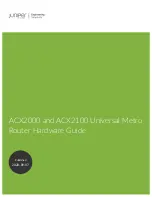
EDS-405A/408A Series User’s Manual
Featured Functions
3-24
Ring Coupling Configuration
For some systems, it may not be convenient to connect all devices in the system to create one BIG
redundant ring, since some devices could be located in a remote area. For these systems, “Ring
Coupling” can be used to separate the devices into different smaller redundant rings, but in such a
way that they can still communicate with each other.
ATTENTION
In a VLAN environment, the user must set “Redundant Port,” “Coupling Port,” and “Coupling
Control Port” to join all VLANs, since these ports act as the “backbone” to transmit all packets
of different VLANs to different EDS units.
Ring Coupling for a “Turbo Ring” Ring
Switch A:
"
Coupler
"
Switch B
Switch D
Coupling Port
Switch C
Main Path
Coupling Port
Backup Path
Coupling
Control Port
To configure the Ring Coupling function for a “Turbo Ring” ring, select two EDS units (e.g.,
Switch A and B in the above figure) in the ring, and another two EDS units in the adjacent ring
(e.g., Switch C and D).
Decide which two ports in each switch are appropriate to be used as coupling ports, and then link
them together. Next, assign one switch (e.g., Switch A) to be the “coupler,” and connect the
coupler’s coupling control port with Switch B (for this example).
The coupler switch (i.e., Switch A) will monitor switch B through the coupling control port to
determine whether or not the coupling port’s backup path should be recovered.
Ring Coupling for a “Turbo Ring V2” Ring
Switch A
Switch B
Switch D
Coupling Port (Primary)
Switch C
Main Path
Coupling Port (Backup)
Backup Path















































